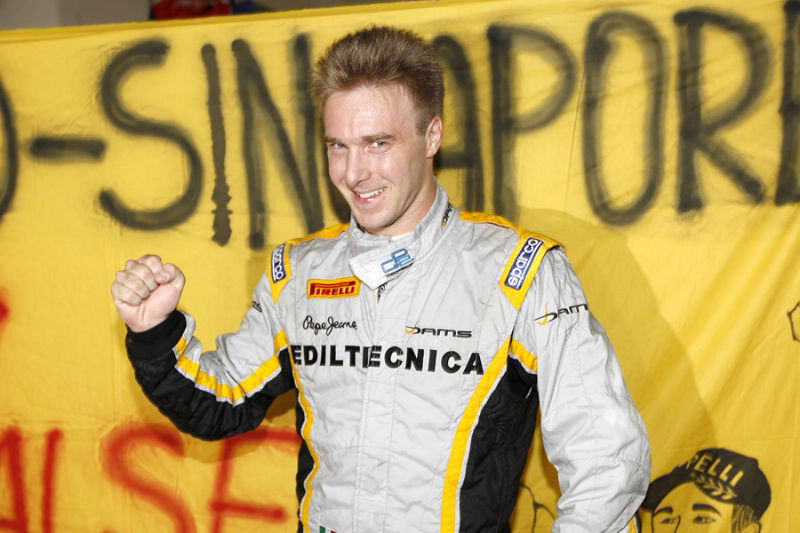Series under fire for driving standards

The quality and standard of driving in the GP2 Series has come under fire from various quarters of the F1 community, following the accident at the start of the 2012 F1 Belgian Grand Prix which was sparked by a mistake made by last year's GP2 Series champion Romain Grosjean.
The latest former F1 driver to weigh in on the issue of driver standards is Alexander Wurz, who made his unhappiness with the quality of driving in GP2 crystal clear on Wednesday.
"Looking at GP2 races, which is the feeder series, the driver standards there are appalling - bad, very bad," Wurz told Reuters. "And they are coming in to F1."
Wurz added that improving the level of driving in GP2 now has to be one of the FIA's top priorities in order to stop a recurrence of the frightening accident at La Source at the start of last week's Spa race, in which airborne cars came close to hitting drivers' hands and heads in their open cockpits.
"It's something we clearly must work on that the feeder series are very strict and of the same standard as F1," continued Wurz. "And we have to achieve this and address it very quickly."
Wurz retired from F1 in 2007, and is a two-time winner of the Le Mans 24 Hour race. As well as owning a road safety training business, the 38-year-old Austrian racer is currently a driver mentor at Williams - which includes advising Pastor Maldonado, the other recent GP2 graduate currently coming under heavy fire for his quality of driving in this year's Grand Prix races.
Wurz' comments come on the same day that Red Bull driver Mark Webber launched his own broadside on driver standards in F1 and the support series, with Webber saying that the improved safety precautions in the cars and at circuits is allowing drivers to be more reckless.
"In the last 10 years, the level of aggressiveness has ramped up a bit just because guys know that usually they'll be able to walk away from a crash," Webber wrote in a column for BBC Sport. "But you can be aggressive and safe or aggressive and unsafe."
Webber - who co-runs the MW Arden GP3 team with Red Bull team principal Christian Horner - added that: "F1 is not a finishing school when it comes to racing," implying that drivers should be far more polished before arriving in F1 in future and that the current state of the drivers graduating from the lower open wheel formulas was not currently good enough (see separate story.)
"You do need to get involved but some guys are having more incidents than the others and they need to take that on board," he said. "We should be the best at what we do, racing in all conditions on all kinds of tracks, and driver etiquette has to match that."
The comments echo those from Ferrari immediately after the Spa crash that took out championship leader Fernando Alonso at the first corner.
"It would be better if, starting with the junior formulae, rules relating to on-track behaviour were enforced in an inflexible manner," Ferrari team principal Stefano Domenicali had said. "[We want] to have drivers as well prepared as possible when they reach this, the highest level of motor sport."
F1 journalist Will Buxton, who provides the commentary for the GP2 and GP3 world television feed, agreed with the call for harsher and more consistent penalties to enforce better quality driving in future. (See separate story.)
"Punishments in single seater motor racing need to be far harsher than they are right now," he wrote on his personal blog last week. "And they need to become clearer and be applied with increased standardisation. From F1 down to entry level Formula Ford, even karting, a racing action of questionable moral standing must have the same regulatory reaction. Inconsistency between categories, and inconsistency even from a race to race basis in an individual category must be stamped out.
Buxton added that Alonso and Domenicali had both said that young drivers entering F1 from GP2 were doing so "with a different core understanding of racing" to their predecessors thanks to the knowledge of the safety advances in the design of modern cars and circuits, and were pushing the risks too far as a result.
"Sadly, I can't argue with that," wrote Buxton. "It's a view even GP2 drivers have shared with me. Not just that their rivals act this way, but even that they themselves have, at times, pushed just a touch harder than they thought they should because they had no fear of the consequences."
But Buxton also defended the GP2 and GP3 Series from some of the criticism, pointing out that F1 had its own part to play in the current state of affairs.
"It's all too easy to say that GP3 and GP2 drivers get away with terrible moves, when those very same moves aren't punished in F1," he pointed out. "Lead by example. Lead from the front. Make an example of the F1 drivers, and make that same example of those in the junior categories, from GP2 and GP3 to WSR, F3, F2, AutoGP."
Buxton pointed to Conor Daly's airborne accident in GP3 at Monaco when he was launched over the back of Dmitry Suranovich's car, and the way that Sergio Canamamas pushed Simon Trummer into the wall at the end of a GP2 race in Hungary as examples of where either the wrong penalties were applied, or no investigation was carried out at all.
"They must learn that they cannot rely on their cars or the racetracks to save them. Only their own actions, and the actions of their racing brothers and sisters on track can do that," summed up Buxton. "But until they learn, until they show the world that they can be trusted with their own safety, and the safety of those around them, they should be punished. And punished severely."
So far there's been no official response to the criticisms from the GP2 and GP3 Series officials, led by chief executive Bruno Michel who has been intent on making the series the best possible route by which young drivers can prepare themselves for a possible Grand Prix career in F1.





